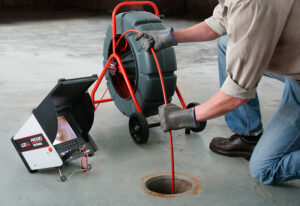Keeping your drains clean is an important part of maintaining a smooth-running plumbing system. Regular drain cleaning will help prevent major problems down the road, such as clogged drains, foul odors, and even water backups.

Leaving these issues unchecked can result in costly plumbing repairs and replacements. Fortunately, there are many easy ways to maintain your drains at home that won’t cost you a fortune.
Clogged drains can cause problems in your home, and they can be tough to deal with. If they go unchecked, water can back up and cause major damage, so it’s important to clean your drains regularly to keep them working as they should.
There are many ways to clean a clogged drain, including using chemicals and mechanical techniques. However, it’s important to remember that chemicals can cause damage to your plumbing system if used incorrectly. You should always follow the directions on any chemicals carefully and wear protective gear when handling them.
The first step in cleaning a drain is to remove anything that could be causing it to get clogged. This includes any food or grease that may have gotten stuck, as well as anything that might be blocking the pipe, such as paper towels or hair.
Another good idea is to run hot water in your sink or tub after you use it, as this helps prevent clogs from developing. Alternatively, you can mix half a cup of baking soda and a few cups of boiling water and pour this down the drain. Let this sit for a few minutes to dissolve any clogs.
If these tips don’t do the trick, you might need to snake the drain or use a specialized cleaner. These products come in liquid or powder form, and they can be quite effective at removing clogs.
One popular cleaner uses a combination of sodium bicarbonate and vinegar to clear out drains. The sodium bicarbonate acts as a base, and the acetic acid in the vinegar works as an acid to break down the clogs.
You can also try using a product that is made with a natural enzyme that eats away at drain buildup. This can help prevent clogs from occurring, but it should be used on a regular basis as it takes time for the product to work.
Lastly, you can rent an electric power auger that has 50 feet of cable and can be used to break through stubborn blockages in drains. This tool is ideal for clearing large clogs in the main line of your house that can’t be reached with basic tools.
Foul odors are one of the most embarrassing plumbing issues you can face. Odors that aren’t cleaned regularly can spread from room to room, making your house smell terrible – and even worse, it can be hard to get rid of them!
Most foul odors come from rotting food, bacteria, or mold. They’re also a sign that something has gone wrong with the drain pipes in your home.
This can happen due to a buildup of grease, soap scum, and other waste products in the pipe. You can try boiling water to help melt this residue and flush it out. You can also sprinkle a little baking soda down the drain to absorb any leftover odors.
Another common cause of foul odors is sewer gasses. These smell similar to rotten eggs, but they are actually made of hydrogen sulfide.
Hydrogen sulfide is produced by anaerobic bacteria that break down organic matter. This process releases gasses that are distinctly smelling and are most noticeable around sinks, toilets, washing machines, and bathtubs.
These gasses can become trapped by the P-trap in your drain line under normal usage, but when this trap becomes empty, they are able to escape. If you regularly run water down the sink or floor drain, this can help refill the trap and stop sewer gases from escaping into your home.
